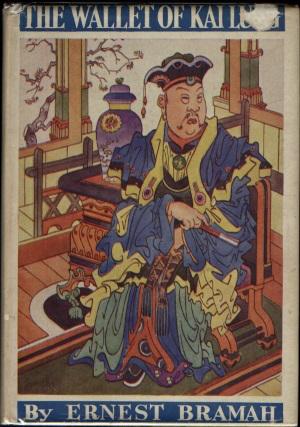
Cover of the 1923 reprint
Book Review by George S. This month we are reading Imperial fiction set in the Far East. My selection only fits a very broad interpretation of the remit, since it is a collection of stories set in a somewhat imaginary historical China, by Ernest Bramah (1868– 1942). I chose it because I have recently become a fan of Ernest Bramah’s detective stories, featuring Max Carrados, the blind detective. These are ingenious, original and highly recommended (and a selection can be downloaded free for your Kindle). Bramah published this collection of Kai Lung stories in 1900, some time before he began writing the Carrados stories.
The stories are set in an imaginary China, at some not very clear period in the past (men threaten each other with matchlock rifles, but there is no sign of Western influence). Bramah seems never to have visited China, but got his idea of the place purely from literary sources, and the stories are entertaining because of the ways in which he exaggerates certain characteristics of traditional Chinese culture, as interpreted by Victorian commentators.
Kai Lung is a traveling storyteller, who tells his tales in a very elaborate polysyllabic style. All the other characters speak this way too. They ceremoniously pay each other flowery compliments and denigrate themselves For example, in the first story, Kai Lung is ambushed by the notorious bandit Lin Yi:
“O illustrious person,” said Kai Lung very earnestly, “this is evidently an unfortunate mistake. Doubtless you were expecting some exalted Mandarin to come and render you homage, and were preparing to overwhelm him with gratified confusion by escorting him yourself to your well-appointed abode. Indeed, I passed such a one on the road, very richly apparelled, who inquired of me the way to the mansion of the
dignified and upright Lin Yi. By this time he is perhaps two or three li towards the east.”
“However distinguished a Mandarin may be, it is fitting that I should first attend to one whose manners and accomplishments betray him to be of the Royal House,” replied Lin Yi, with extreme affability. “Precede me, therefore, to my mean and uninviting hovel, while I gain more honor than I can reasonably bear by following closely in your elegant footsteps, and guarding your Imperial person with this inadequate but heavily-loaded weapon.”
The comedy often comes from the contrast between the elaborate politeness of the words and the extreme brutality and insensitivity of the action.
In that first story, Kai Lung has no money to pay the bandit, and is about to be hanged, but with the noose around his neck he tries to placate the bandits with a story. This tells of the adventures of Ling, who wants to escape the fate of being a bowman by passing the civil service exams. These exams, corrupt and very difficult, are the subject of satire in many stories. When Ling passes, the Emperor in his graciousness, makes him commander of a company of bowmen. Something of an innocent, he wants his company to win the battle, rather than just perform exactly according to the standard rules of the civil service. Eventually he succeeds, and also wins his girl. Many of these stories have the pattern of the traditional fairy story, with a naïve young man from the country winning out against all odds.
The appeal of the book is its Orientalism. Bramah’s China is a land ruled by absurd and arbitrary codes, which keep people in their places. The Emperor’s power is arbitrary, and the mandarins, who head the civil service, are utterly ruthless in dealing with threats to their position, while maintaining a constant surface of extreme and absurd politeness.
Maybe this is what British people wanted to hear about China at this time. Imperialism in Africa could be justified by presenting Africans as primitive and childish peoples who needed to be kept in order by strict but kindly British authority. The Chinese were obviously not primitive, with an ancient civilization stretching back centuries. So they were shown as over-elaborate, possessed by thoughts of ancestors and rituals, with a social system of extreme rigidity. So we are better than them, too. Sometimes the book is mildly satirical of European institutions and practices, describing them as though they were ancient Chinese inventions.. Here’s a description of one character’s way of making money:
Tiao had in the meantime accepted the wedding gifts of an objectionable and excessively round-bodied individual, who had amassed an inconceivable number of
taels by inducing persons to take part in what at first sight appeared to be an ingenious but very easy competition connected with the order in which certain horses should arrive at a given and clearly defined spot.
In other words he’s a bookmaker.
One story offers a sort of satire on socialism, when the Emperor is persuaded that everyone in the land should be equal – except, of course, for himself. This, like most of the satire, is playful rather than fully developed, though. The Mandarins of the Chinese civil service are presented as all-powerful and arbitrary. The Oxford English Dictionary notes the first use of ‘mandarins’ to describe the upper echelons of the British Civil service in 1907. Does that show the influence of this book?
I gather that the book was not a popular success when it first appeared in 1900, but became something of a cult, and was admired by people like Hilaire Belloc and J.C. Squire. The book was reprinted in the twenties with success, and Bramah produced several volumes of sequels. Two of these had introductions by Belloc and Squire. Some writers seem to think that these later volumes are more successful than this first one.
Would I read another? Probably, but in small doses. I got slightly fed up with the style over ten stories. The Carrados detective stories are another matter. I shall definitely gorge on some more of them.

